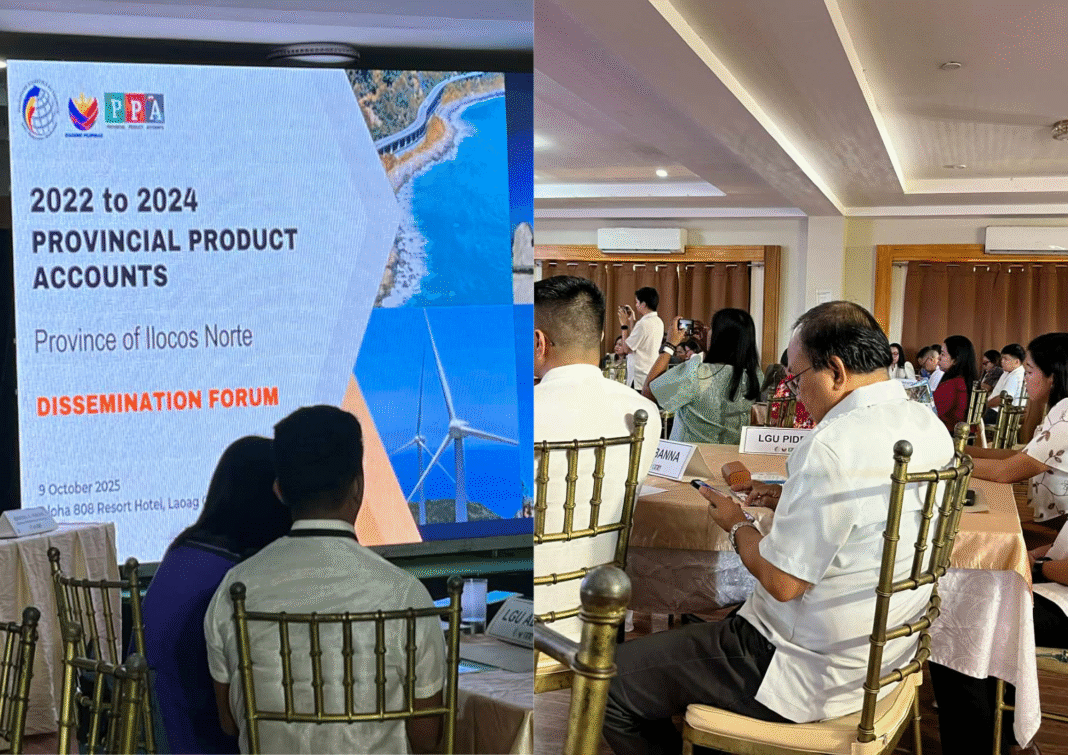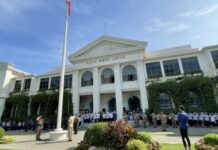By Mary Therese D. Ancheta and Shaira Mae A. Baniaga
LAOAG CITY, Ilocos Norte — Ilocos Norte continues to be among the fastest-growing provinces in Region I in the past two years, driven by notable gains in tourism, industry, micro, small, and medium enterprise (MSME) development, and employment generation.
This achievement was presented during the 2023–2024 Provincial Product Accounts (PPA) Dissemination Forum on October 9, 2025 at the Aloha 808 Resort Hotel in Laoag City.
Jeffrey Dela Cruz, project evaluation officer of Provincial Government of Ilocos Norte (PGIN), emphasized that the PPA serves as a vital tool in shaping evidence-based development strategies by accurately measuring the province’s total output of goods and services.
Through these data-driven insights, local policymakers can now design more targeted interventions that promote inclusive and sustainable growth.
Tourism leads economic growth
Tourism remains Ilocos Norte’s strongest economic driver, contributing ₱10.4 billion to the province’s Gross Domestic Product (GDP). Most tourism activities—ranging from hotel accommodations, restaurants, and tour services to transport and leisure facilities—fall under the services sector, which has been the primary engine of the province’s economic growth in recent years.
The province’s strategic approach focuses on promoting its rich cultural identity through major events such as the Tan-ok ni Ilocano Festival, investing in modern attractions like the Ilocos Norte Water Park, and participating in national and international travel markets including the Philippine Travel Mart.
In 2024, It also hosted international events such as the arrival of the Norwegian Jewel cruise ship, which resulted in a 70% increase in tour package sales and a rise in high-value visitor arrivals.
Complementing these gains, the Summer Tourism Employment Program continues to create job opportunities for youth and senior citizens, hiring 318 local ambassadors this year.
Industry and MSMEs fuel local development
The industry sector also contributed significantly to the local economy, generating ₱63.3 million in extraction fees under Provincial Ordinance No. 72-2024, otherwise known as the Ilocos Norte Sustainable Tourism Development.
Thus, the province issued 37 special permits to ensure sustainable infrastructure development and trained 109 personnel to strengthen regulatory compliance and safety standards.
Meanwhile, the Producers-to-Consumers (P2C) initiative for MSMEs has generated over ₱16 million in sales, providing direct market access for local entrepreneurs.
Through the Ilocos Norte MSME Incubation Center (INMIC), more than 5,500 entrepreneurs received technical assistance for food and non-food product processing, fostering innovation and business resilience.
Employment programs
The Public Employment Service Office (PESO) organized 23 recruitment activities with 11 new employers, maintaining a 945-member network that offers continuous job opportunities.
For overseas employment, the province partnered with five accredited recruitment agencies to secure high-paying jobs abroad, ensure safe deployment, and enhance remittance services.
These efforts are supported by local training programs aligned with industry demands, improving employability especially among youth and returning overseas workers.
Addressing development gaps
Dela Cruz also underscored the need to address lingering challenges in agriculture, tourism, and market access to sustain the province’s growth trajectory.
“To sustain Ilocos Norte’s economic momentum, it is essential to address development gaps in agriculture, tourism, and market access. Unpredictable climate conditions continue to threaten food security, requiring adaptive technologies and resilient farming systems,” Dela Cruz said.
He further stressed that strengthening support for producers and improving infrastructure remain top priorities for long-term growth.
“Limited marketing opportunities and access to capital hinder farmers from maximizing income, while the presence of animal diseases such as African swine fever and avian influenza pose a risk to livestock productivity. As for tourism, the province faces challenges in infrastructure development and stakeholder coordination, which limit its full potential as a growth sector,” Dela Cruz added.
Toward a resilient and competitive future
Looking ahead, Ilocos Norte is conducting feasibility studies for offshore renewable energy projects expected to attract major investments and enhance energy competitiveness in the coming years.
The provincial government remains committed to strengthening health and social systems, expanding entrepreneurship, promoting climate resilience, and ensuring sustainable livelihoods.
Programs such as solar-powered irrigation systems, the Inspire Swine Recovery Program, and cold storage facility development for crops and fisheries aim to boost productivity and protect farmers’ incomes.
Ilocos Norte’s 2023–2024 performance reflects not only a strong economic foundation but also a commitment to sustainability and inclusivity.
With evidence-based planning, innovative programs, and collaborative governance, the province continues to position itself as a model of balanced growth and resilience in Northern Luzon. (CCMT/MTDA/SMAB, PIA Ilocos Norte)




